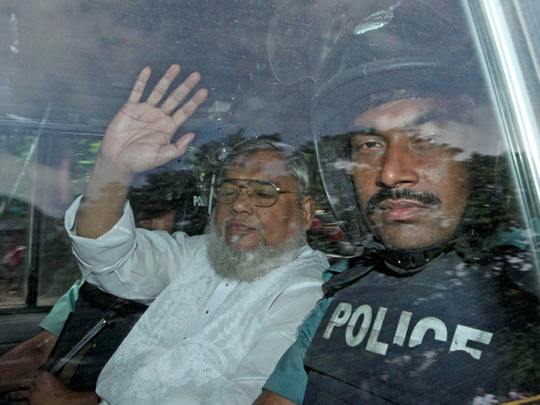
Dhaka: A Bangladesh court Wednesday sentenced a senior leader of the country’s largest Islamic party to death for crimes committed during the 1971 liberation war against Pakistan.
Ali Ahsan Mohammad Mujahid, 65, was found guilty of five charges, including abduction and murder, and was sentenced to death by the much-criticised International Crimes Tribunal.
“In three out of five charges he was given the death sentence,” the country’s junior attorney general and prosecutor M.K. Rahman said.
Justice Obaidul Hassan ordered Mujahid be “hanged by the neck” after the panel of three judges read out the verdict to the packed courtroom in the capital Dhaka, amid tight security.
Mujahid was found guilty of “superior responsibility” and “criminal liability” of the atrocities.
The judgment said it found valid the allegations that Mujahid was personally involvement in systematic persecution of Hindu community and the complaints that he commanded a systematic campaign to kill leading Bengali intelligentsia to expose the nation to a state of brainlessness.
The tribunal said Mujahid ordered murder of leading journalist Sirajuddin Hossain and instigated a Pakistani military officer to torture and kill several prominent figures including famous musician Altaf Mahmud and freedom fighter Rumi “before the (Pakistani) president declares an amnesty”.
Witnesses said Mujahid, who was the second in command of infamous Al Badr militia force, manned mainly by Jamaat’s the then student wing, initially looked expressionless as he was brought to the dock but appeared perplexed as the judge handed down the punishments.
Security forces whisked him away from the dock after the verdict was delivered as he screamed claiming he was “victimized” for his role in Islamic movement while officials said he was immediately brought beck to the jail.
Security was tightened in Bangladesh capital as a special tribunal is set to deliver another crucial verdict more than a month after it wrapped up the trial hearing.
This was the second judgment in two days after International Crimes Tribunal-1 handed down 90 years of imprisonment to former Jamaat chief Ghulam Azam sparking massive reactions with critics calling it inadequate while his supporters claimed he was exposed to injustice.
Jamaat, meanwhile, enforced a nationwide general strike afresh Wednesday to protest Mujahid’s conviction beforehand while the non-partisan Ganajagaran Manch that comprises students and young professionals staged a sit in vigil demanding his maximum punishment at the Shahbagh Square.
The tribunal indicted Mujahid on Jun 21, 2012 on seven charges including the planned massacre of particularly a number of famous university professors and professionals just two days ahead of Bangladesh’s December 16, 1971 victory with crucial Indian help.
“Nothing but the death penalty would be appropriate for such a devil [Mujahid],” Prosecutor Tureen Afroz told the tribunal at the end of the prosecution arguments last month.
The defence lawyers, however, completed their arguments claiming that the prosecution had failed to prove the charges brought against Mujahid.
Several political analysts said Mujahid was the person who sparked public anger afresh against 1971 war crimes by his visibly audacious comments ridiculing frequently the Liberation War veterans in the past years.
Demands for the trial of the war criminals resurfaced in 2008 largely after Mojahid commented that the “anti-liberation forces never existed” as he denied his party’s role in 1971 while party called it a “civil war” intensifying the public outrage.
A former technocrat minister of the past 2001-2006 BNP-led four-party alliance government with Jamaat being the main partner, Mujahid, however, earlier claimed he forgot “many things” he did in 1971.
But newspaper archives including that of his party’s mouthpiece Daily Sangram appeared to be of great help for prosecutors in retrieving his “lost memories” during the trial.












